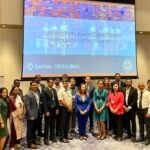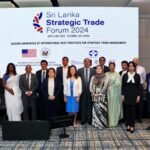
MBASSADOR JULIE CHUNG’S REMARKS AT THE COCA-COLA/WORLD VISION ASPIRE SRI LANKA PROJECT EVENT

Good morning,. It is an honor to be here today at the ASPIRE-Sri Lanka Project Closure and Felicitation Ceremony. How wonderful to have just heard from a number of the women involved in this project, to hear their personal stories on how their livelihoods were uplifted. And to hear women talk about the impact on their families, their children. Not only does this project provide skills and income, it’s teaching the next generation to follow their parents’ examples on caring for our planet. It’s all about the cascading impact and dignity in labor that previous speakers talked about.
This event is an important step in our collective efforts towards sustainable development, women’s economic empowerment, and environmental stewardship in Sri Lanka.
I would like to begin by acknowledging the tremendous contributions of two remarkable organizations: The Coca-Cola Foundation and World Vision Lanka. Their collaboration on the ASPIRE project has been instrumental in driving positive change and fostering sustainable practices in waste management and recycling.
The Coca-Cola Foundation, the philanthropic arm of The Coca-Cola Company, has shown unwavering commitment to creating sustainable communities through strategic investments in social and environmental initiatives. I’ve spoken before about the Coca-Cola company’s commitment to social justice in the United States, supporting civil right pioneer Martin Luther King, Jr. In Sri Lanka, the Foundation’s efforts have been particularly impactful. From renovating water reservoirs in Anuradhapura, Monaragala, and Batticaloa to ensuring reliable access to clean water, their initiatives have supported agriculture, improved public health, and enhanced the overall well-being of thousands of residents. It makes me proud to see an American foundation with such a strong commitment to the people of Sri Lanka.
World Vision Lanka, with its roots in the United States, has been a steadfast partner in this journey. Since 1977, they have worked tirelessly across 15 districts in Sri Lanka to overcome poverty and injustice, focusing on children, families, and communities. World Vision Lanka is also a USAID partner and we both share a desire to support development in Sri Lanka. In fact, USAID, has been doing development work to empower women entrepreneurs in Sri Lanka since the 1970s.
The ASPIRE project has made significant strides in enhancing the collection and recycling of PET plastic in Sri Lanka. These efforts have not only promoted responsible waste segregation and recycling but also empowered communities and fostered economic growth. USAID also has a similar project on empowering women recyclers, working with Cold Storage Stores and John Keels. I visited a recycling facility a few months ago and met with some of the women from Jaffna and Batticaloa and saw products like brooms and brushes made from recycled materials they’ve collected, then sold to market. One woman, who is also a kindergarten teacher, spoke about teaching her class about the importance of recycling and preserving our planet. We all want to leave behind a world for our children that’s both free of waste, and where all people, women and men alike, can be full economic participants.
This aspects of the ASPIRE project that focuses on empowering women entrepreneurs has been especially inspiring to me. By creating job opportunities for both men and women, the project has provided them with the tools and resources needed to succeed in the recycling industry and uplift their families and the communities around them. This empowerment extends beyond mere employment; it includes comprehensive support such as providing storage facilities, essential equipment, and even organizing special events to celebrate their contributions. The fact that, during International Women’s Day, the project supported women collectors by providing dry rations and financial assistance, recognizing their pivotal role in the community, is heartwarming to me.
As we celebrate the success of the ASPIRE project today, let us also recognize the broader impact of such initiatives. They serve as a testament to the power of collaboration between the private sector, local government, non-governmental organizations, temples, churches, mosques, and local communities and the partnerships between Sri Lanka and the United States. Together, we can create a more sustainable and prosperous future for all.
In closing, I extend my heartfelt gratitude to The Coca-Cola Foundation and World Vision Lanka for their unwavering commitment to environmental sustainability and community empowerment. Your efforts have made a lasting difference, and I am confident that the legacy of the ASPIRE project will continue to inspire and drive positive change in Sri Lanka and beyond.
Thank you.
Sources by – us embassy in Sri Lanka



